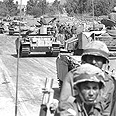
Yom Kippur War. Not just about raising Israeli flag on Mount Hermon outpost
צילום: לע"מ
Warning against arrogance
Op-ed: Blow suffered in Yom Kippur War reminder that Mideast’s strongest army isn’t omnipotent
The statistics published ahead of Rosh Hashana about Israel’s current state, the number of citizens, birthrates, economic growth and so on did not highlight the figure that interests me more than anything else: How many of this country’s residents experienced the Yom Kippur War, 37 years ago?
The answer: Fewer than half; much fewer. They weren’t born then, or were too young, or lived abroad. The fact is that only one or two of our current generals took part in that war. For the others, the Yom Kippur War is about lectures or gossip they heard about the wars of the generals during that war.
And we say: Only those who were here at the time would be able to understand us. It’s not about people changing their political views in the wake of that war. The opposite is true: Many views were reinforced. Those who fought for a deep geographical barrier argued, and rightfully so, that “we told you so!” Imagine what would have happened to us had the Sinai desert not serve as a barrier between Israel and Egypt? Meanwhile, those who believed that war isn’t the solution and that we must pay for peace also reinforced their views: Why and for what did 2,650 people pay with their lives? (In retrospect, that war ultimately led to a peace treaty.)
Israelis who weren’t here at the time live under the illusion that Operation Defensive Shield or the Second Lebanon War or Operation Cast Lead were all wars. Well, they weren’t even the prelude to the introduction of a war. Only those whose breath froze upon hearing that siren in the midst of Yom Kippur and didn’t understand what was going on know what it’s like.
Only those who heard Max Maman’s horrific cries for help from the besieged Suez Canal outpost, only those who received the fatality lists (hundreds a day,) only those who saw the mess on the road leading to Sinai, the helplessness of the commanders, the curses and wars of the generals, only those who flew from Sinai aboard a Dakota with dying soldiers whispering for help know that we indeed were – and still are - the Middle East’s most powerful army, but that even the strongest army can sustain a difficult blow when war comes.
Only those who saw the turned over tanks on the Golan Heights and the bristles of the red-eyed soldiers know that the Mideast’s strongest army can turn defeat into victory. Those who weren’t here back then, who were not overcome by anxiety, which turned into concern and then into the fatigued smile of achievement can babble about how we’ll “pulverize our enemies.” At 2 am on that Yom Kippur, all the chatterboxes grew silent. Yet 37 years are apparently enough time to raise a new generation of arrogant people.
An in-depth study published this year by Bar-Ilan University’s Begin-Sadat Center determined that an Israeli strike in Iran would prompt Tehran to embark on an endless war, even if it will last years, against Israel until the Jewish State is eliminated. Some say the study’s findings are exaggerated and even baseless, yet those whose job it is to assess these matters must not under any circumstances assume that we’re omnipotent.
We are not. Those who were there during the Yom Kippur War know that this war was not just about the raising of the Israeli flag on the Mount Hermon outpost, but also about the “help, they’re butchering me!” cries uttered by Jerusalemite bank clerk Max Maman, may he rest in peace.
We should not be envious of those who take part in security consultations, and we should certainly not be envious of those who must take the decisions. We just wanted to share with you the answer of an admired general, God’s deputy during those days. “What was your mistake?” We asked Shmuel Gorodish-Gonen, the IDF’s Southern Command chief at the time.
He replied in a tired, broken voice: “I thought it would be the seventh day of the Six-Day war.” Thousands paid with their lives for this line of thought.
- Follow Ynetnews on Facebook










